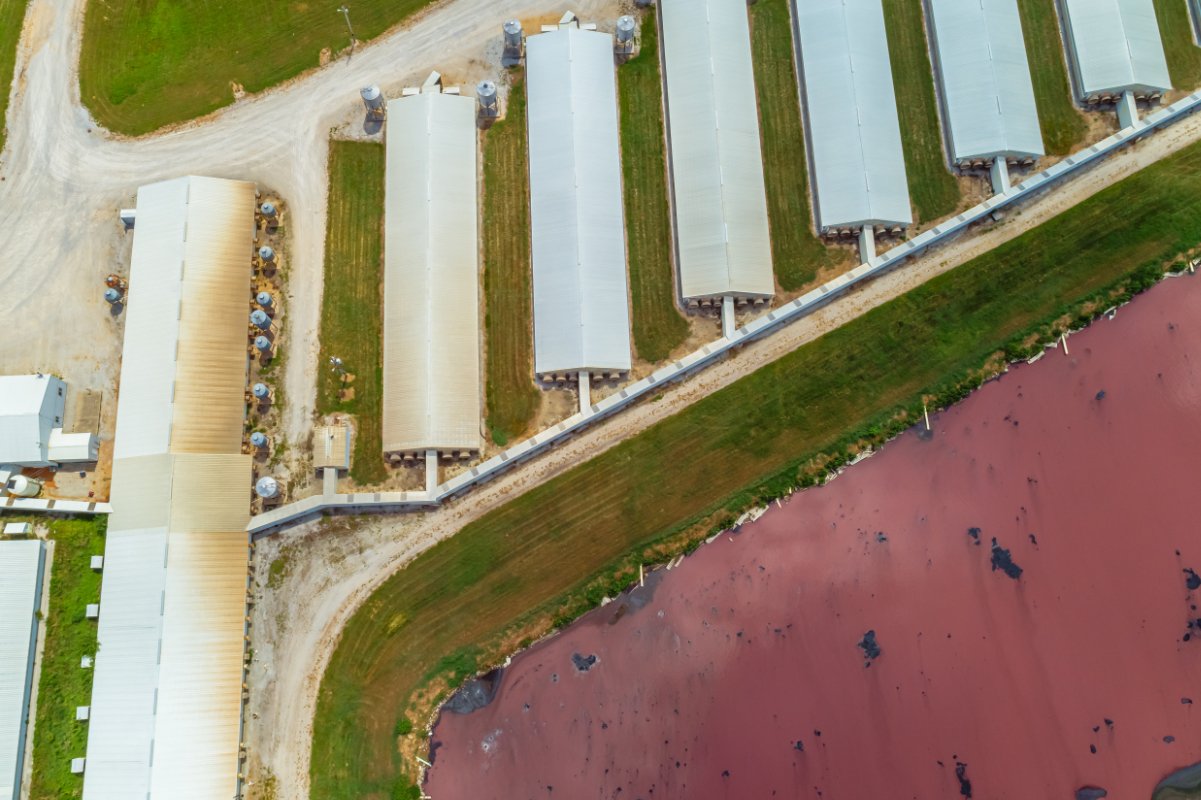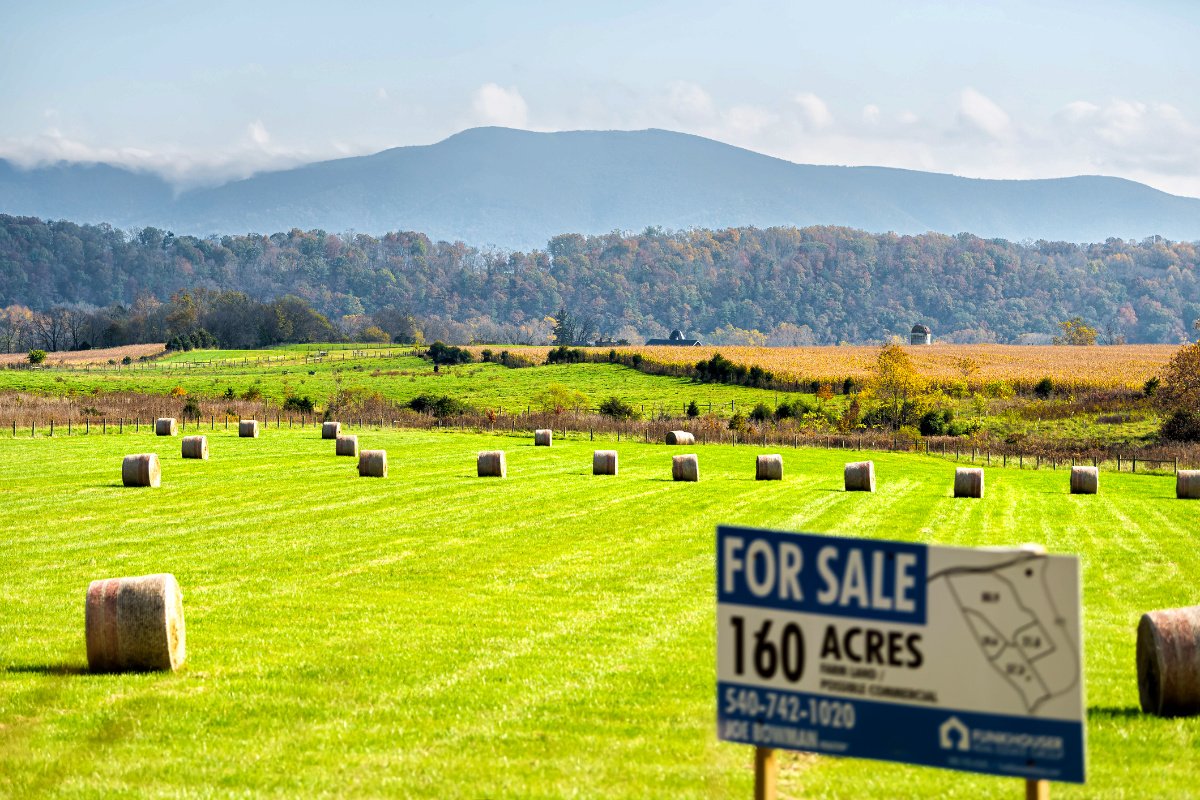In this week’s Field Report: changes underfoot to regulate CAFO pollution, animal welfare label claims, and more funding for climate farming.

In this week’s Field Report: changes underfoot to regulate CAFO pollution, animal welfare label claims, and more funding for climate farming.
April 11, 2023

An overhead image of a Concentrated Animal Feeding Operation and manure pits. (Photo credit: Aaron Yoder, Getty Images)
As a result of a series of recent developments, industrial farms that raise thousands of animals in concentrated animal feeding operations (CAFOs) are facing new regulations aimed at preventing water pollution. And the American public will soon have additional information about just how much pollution the facilities create each year.
Last week, advocacy groups logged victories in two significant court cases. In one, a judge decided that CAFOs that were previously exempt from environmental impact assessments will now be required to complete them in order to access government loans. In another, the Environmental Protection Agency (EPA) agreed to respond by August to a petition it had ignored for more than five years. In the petition, advocacy groups detail loopholes in CAFO permitting and outline a plan for the agency to more closely regulate the facilities under the Clean Water Act.
“This issue has gone unaddressed for so long by the agency that it really forces us and our allies to put more and more pressure on EPA to get something done,” said Emily Miller, a staff attorney for Food & Water Watch, one of the organizations involved in the lawsuits. “It has been years—decades, really—since they’ve taken a hard look at this industry and its pollution.”
As animal agriculture has consolidated and shifted toward larger CAFOs over the last several decades, the industry has evaded many of the environmental regulations to which other industries are held. Last year, researchers at the Environmental Integrity Project found that over 50 years, the Clean Water Act successfully tackled pollution from many industries—except agriculture. They pointed to runoff from CAFOs and crop fields as the largest reason that half of the country’s waterways are impaired. Another 2019 analysis found that no permits or other data existed for half of the CAFOs the EPA estimated were operating.
Last week’s developments come on the heels of a court case from earlier this year that could specifically address that data gap. In response to advocacy groups’ accusations that the agency has been violating its annual Clean Water Act obligations to monitor CAFO pollution, the EPA announced it will complete a detailed study of the industry and its water pollution impacts, with data to be published this summer.
“If EPA does this study correctly and really takes a comprehensive look at the industry’s waste streams,” Miller said, she hopes is that “it will lead to the unavoidable conclusion that the regulations these industries are subject to now don’t work and need to be stronger.”
There is precedent for that pathway. In 2021, EPA studied pollution from slaughterhouses and determined that meat and poultry plants discharge the most phosphorous and the second highest levels of nitrogen—nutrients that cause dead zones in waterways—compared to other industries. The agency followed that up by announcing that it will propose updates to water-pollution rules for slaughterhouses by the end of this year.
Of course, agriculture groups and meatpackers are bound to push back, and the outcome of all of this movement is far from certain.
In fact, last week, President Biden also vetoed a Congressional attempt to weaken a rule that defines which waterways in the country are subject to regulations to prevent pollution. And while that decision supports the overall shift toward more stringent protections for waterways, the rule’s long history demonstrates just how complicated and winding the fight over water pollution from agriculture can be.
Environmental and farm groups have been fighting over what is referred to as WOTUS, or waters of the U.S., since the Obama era. Each subsequent administration has changed the rule, while rumors and misinformation about what it does and doesn’t allow farmers to do have often received more attention than the rule itself. Meanwhile, one aspect of it is currently being considered by the Supreme Court.
In other words, it will be a while before there’s any clarity about the real implications of these court decisions and EPA announcements on the nation’s waterways—but in the meantime, change appears underfoot.
Read More:
The Field Report: The Clean Water Act Has Failed to Curb Agricultural Pollution
EPA to Revise Outdated Water Pollution Standards for Slaughterhouses
Op-Ed: Water Pollution in Iowa is Environmental Justice
Label claims. Last week, a group of lawmakers waded into the murky world of meat labeling. Senators Richard Blumenthal (D-Connecticut), Cory Booker (D-New Jersey), Elizabeth Warren (D-Massachusetts), and Sheldon Whitehouse (D-Rhode Island) sent a letter to the USDA asking the agency to evaluate its guidelines for the use of animal welfare claims including “humanely raised” and “sustainably farmed.”
The senators cited a recent report from the Animal Welfare Institute (AWI) that found that while the USDA is supposed to deny the use of false or misleading label claims, companies never applied to substantiate about half of the products that included claims. Also, AWI found that the USDA does not have legal definitions set for terms including “animal welfare,” “humane,” or “sustainable.” Companies are able to define those terms on their own, making it difficult for shoppers to make sense of them.
“Without clear labels, consumers are robbed of their ability to purchase in accordance with their values,” the senators wrote. “The USDA has an obligation to ensure consumers have the information necessary to make informed choices about the products they purchase and that hardworking farmers and producers are able to compete on a level playing field.”
Animal welfare claims on meat, including those that are certified by third-party organizations, have long been controversial and confusing for consumers, and not even animal welfare organizations agree on how some terms should be defined.
Read More:
Are Some Animal Welfare Labels ‘Humanewashing’?
Fast Food and Grocery Giants Promise to Sell ‘Better’ Chicken. Is It Enough?
Climate Money in Action. Last Thursday in Ames, Iowa, Agriculture Secretary Tom Vilsack announced that the USDA had awarded $40 million to 31 new Conservation Innovation Grant (CIG) recipients and $19 million to fund two Regional Conservation Partnership Program (RCPP) grants. CIG is a special program within the Environmental Quality Incentives Program (EQIP) that funds projects that test innovative new conservation practices via on-farm trials. The funded projects include innovative rice irrigation techniques, biochar addition to farm soils, and microbial feed supplements to reduce methane emissions from dairy cows.
RCPP grants involve multiple partners coordinating in one region. The two new projects include one focused on using biochar and other techniques to improve soil health in the Mississippi River Basin and another that will create networks of farms around anaerobic digesters, which process manure to reduce methane emissions.
All of the money comes from the additional conservation funding provided by the Inflation Reduction Act.
Read More:
Is This Biochar’s Big, Carbon-Rich Moment?
Are Dairy Digesters the Renewable Energy Answer or a ‘False Solution’ to Climate Change?
What the Historic Climate Bill Means for Farmers and the Food System

October 9, 2024
In this week’s Field Report, MAHA lands on Capitol Hill, climate-friendly farm funding, and more.
October 2, 2024

October 2, 2024

October 1, 2024

September 24, 2024

September 18, 2024

Like the story?
Join the conversation.